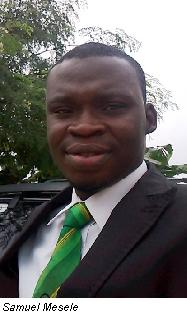A Ph.D scholar, attached to the Soils of Forest Islands in Africa (SOFIIA) Project in the University, Samuel Mesele, has described improved environmental management and planning, as the major solution to ending erosion, landslide and flooding in the country. Making this call in commemoration of the 2016 World Soil Day, held recently, the young researcher stated that soil was a valuable non-renewable natural resource, whose functions are not only significant to life, but support plant growth and in the provision of ecosystem services.

The SOFIIA scholar said that the soil contains 16 essential nutrients that are vital to both plants and man, adding that the protection of the soil resource was essential, since that formed the basis for why human survival on the earth is hinged. Explaining further, he pointed out that in major fields of human endeavour such as medicine, pharmacology, genetics and engineering, there are always opportunities to produce new and more powerful drugs in the case of medicine, hybrids in the case of genetics or new models in the case of engineering, but in soil science, once the soil is degraded, there are no opportunities to produce new soil or new soil varieties. Hence, the effective management of our soils remains imperative and a responsibility for all.
He reiterated the call of the President, African Soil Science Society (ASSS), Dr. Mamadaou Traore, during the 2016 conference, when he asserted that, “poor soil produces poor people and poor people make the soil worst”. Samuel stated that the implication of the statement meant that when the soil is poor in quality, it gives very low yield that cannot economically sustain the community; thereby putting the people into poverty; and when the people become poor, they lack access and the capacity to improve the soil by leaving the soil in a more deplorable condition making the future bleak for future generations.
To further buttress his point, the researcher stated that soil was central to world’s major challenges such as food insecurity, climate change and human health. “It is in the recognition of this, that 5th of December every year, is set aside as the World Soil Day. Soil health is a key contributor to achieving food security in Nigeria and West Africa at large. Fertile and productive soils, when properly managed, would guarantee healthy, safe and enough food for the present generation, without compromising the food needs of future generations. Soil also contributes significantly to climate change, as the effect could be positive or negative, depending on how the soil is managed”, he said.
Lamenting the effects of inappropriate soil management practices, Samuel said these could lead to increased emission of greenhouse gases that are responsible for global warming. He highlighted practices that could affect the soil negatively, to include inappropriate disposal of spent engine oil, old cell batteries from radio or torch-lights, household wastes like aluminum pots, table water sachet and plastics. He called for an attitudinal change, stressing that every action taken by man could impact positively or negatively on soil health, as well as the underground water resources. He disclosed that mitigating the impact of climate change was the responsibility of all and required the sustainable management of soil resource and health even as he gave this charge saying “Watch your actions! Keep the soil safe and healthy! Preserve the prosperity of the generation yet unborn”.
